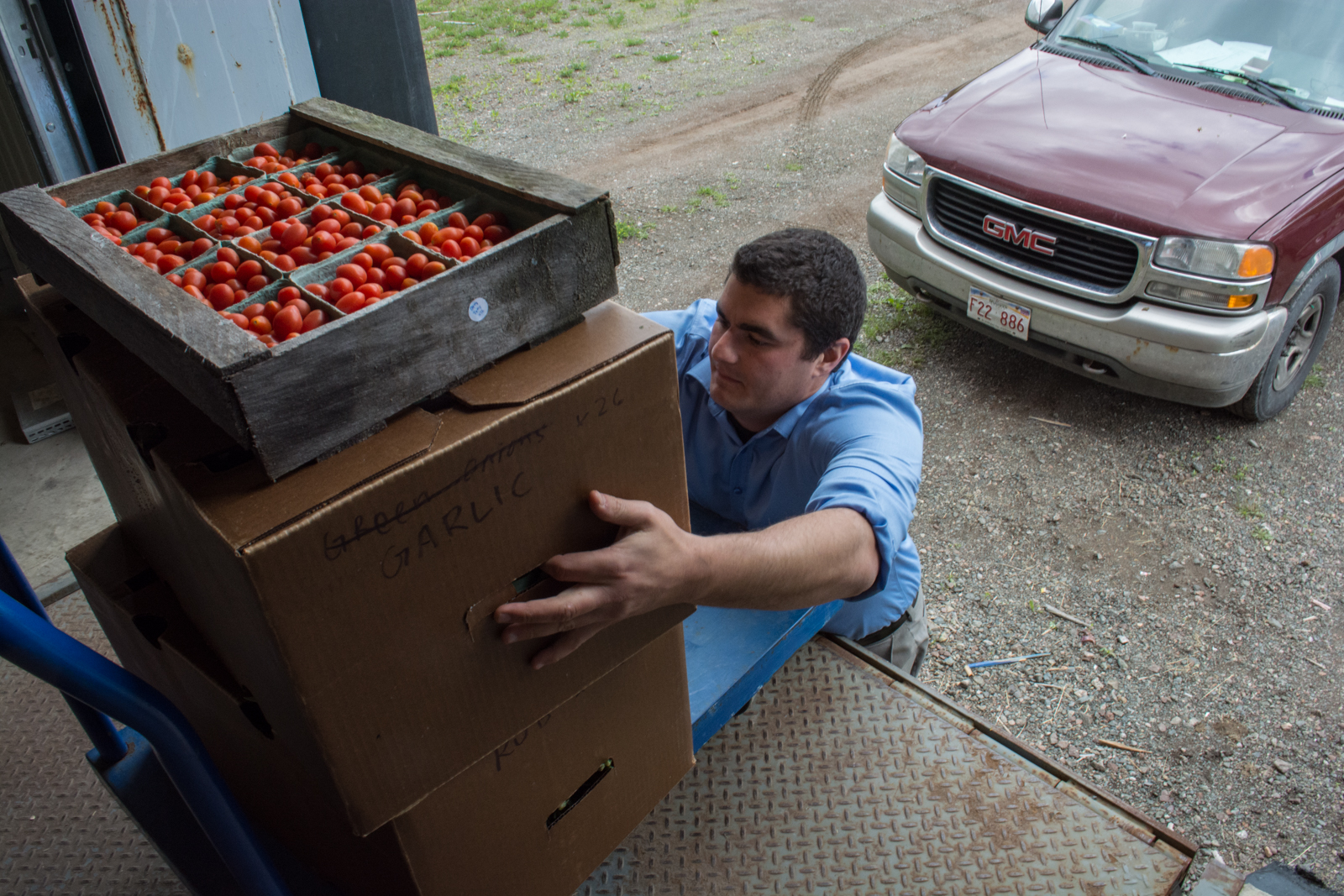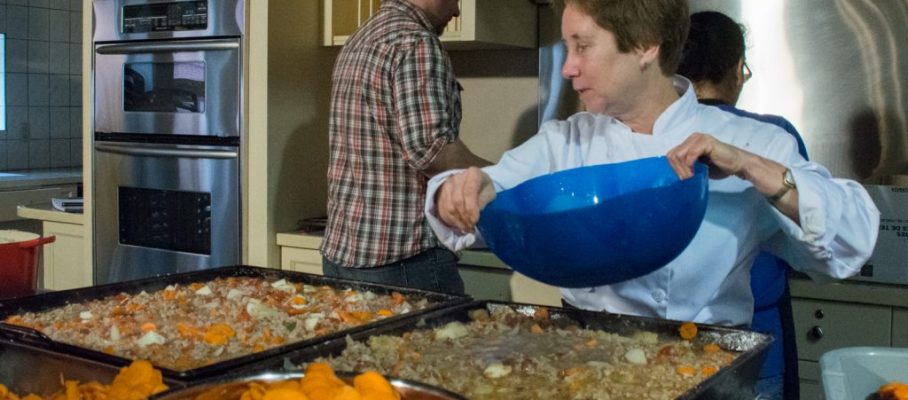Last spring when we heard the rumours of a farmers market on wheels we thought, It’s about time. And obviously so did a lot of other people because The Farmers Truck’s Facebook Page had 4,000 likes before the summer was even out. So popular and timely was the mobile market that people were volunteering to work on it – not a problem most businesses have.
Season 2 promises to be even better with a second, improved truck, an online store complete with home delivery, more products and even, potentially, a performing carrot.
Frederic Laforge and Mathieu Reyjal are the entrepreneurs behind this local business and what we like about them is the solid farming roots they have. Frederic’s father has been a farmer most of his life and Mathieu became a farmer out of university. The idea for The Farmers Truck came out of a professional connection when Frederic was helping Mathieu develop his farm’s logo and brand.
Frederic says the idea came when he was admiring the little country store Mathieu had made at his farm. “But,” he told Mathieu, “it really sucks that I would have to drive out to Cap Pelé. It’d be awesome if it could be mobile.” The discussion started from there.
It took a year of researching, designing, branding, planning and a $25,000 investment to roll out the first truck. Last summer they worked the truck themselves for a month and then hired a crew.
The goal of the truck is an authentic farmers market experience. “To have a little bit of everything,” says Frederic, “so when you get there you can actually get your milk, your cheese, your meat, your vegetables and bread and you go home and have a nice meal. You wouldn’t have to go anywhere else.”
Respect for local farmer
Respect for local farmers is at the heart of their business model. “Back in the day when you were a farmer you were a pillar of the community and now it’s almost like you get looked down on,” Frederic says. “And the retailer is the one who owns the market, dictates what they want to pay for stuff. The one they’re squeezing out is the farmer.”
By contrast, The Farmers Truck sources those farmers as directly as possible and their sources are never more than 160 km (as the crow flies).
Timing is right
The timing of The Farmers Truck business is right not only for consumers, but for local farmers, too. “There have been a lot of changes in food in the Maritimes,” Mathieu says as we’re driving back to their warehouse for more produce for the next rush. It’s the first day of the new season.
For example, Sobeys bought Co-op, he says, and all the contracts for medium-sized farmers got washed away. “All of a sudden all those medium-sized farms are competing with small farmers.”
Back at the warehouse I get the tour. The warehouse is huge and he shows me where their portion is, but there are no walls separating the other spaces. Everything is just getting started at this new location just a couple of minutes from where the truck was on St. George and Cameron. There is a walk-in cooler with a couple of shelving units and there is a space back in the main area where he has a foldout table for a desk.
This is Mathieu’s domain. “Fred is the marketing expert and I’m in charge of logistics,” he says. Mathieu is the one who connects with farmers, a job he obviously relishes, being a farmer himself. However, he has taken the year off farming to put himself completely into The Farmers Truck business.
While he is getting supplies to restock the truck he explains how none of the food will be wasted. If there is anything that doesn’t get bought and won’t keep, the staff can take it or it will go to the new Community Food Centre in Moncton.
New generation of entrepreneurs
These two guys are the new generation of entrepreneurs. They are in it for the money, for sure, and they use all the technology and social media they can; but they believe they must also be doing good for their community. Frederic says they intend to be a B Corporation business whose members are socially responsible. But again, they are a business first.
He says there have been many mobile markets, but most are charities that target food deserts, that is, areas that don’t have access to good grocery stores. While he applauds the idea, he believes that for the business to be sustainable, it must be run as a business.
Franchise opportunities
However, Frederic says, “We don’t want to be in the operating of the truck. Our goal is to franchise.” “We are a retail solution company,” Mathieu says. “The idea is that we are making a product which is a truck and we will make a brand.” Their big goal is that you will be able to buy from a Farmers Truck anywhere across North America.
The core of that franchise, though, will be local sourcing, that is, no industrial food hubs. “Our mission is buy local, sell local. It’s nonnegotiable and we’ll enforce that on our franchisees,” Frederic says. “
Frederic says, “The long term plan is to, say, have a little co-op of farmers, five or six farmers, and all together they have one truck that they supply and basically they make one-hundred percent of the profit.”
But, he says, “Some of the franchisees won’t be farmers. Maybe they will be young kids who believe in the idea. You can make a decent living having one of these trucks, and encourage your local economy.”
And in the off season, there will be an online store with home delivery to keep franchise owners going when it’s too cold to wait at a truck on the corner.
For now, though, there is only the Moncton operation and they’re still using the first truck they started as a bootstrap operation. But on July 1 the new improved truck should be ready and it will have, among other things, the ability to sell meat.
Tracking them down
Proof of their natural popularity is they barely have to advertise. Most of their marketing is done through their Facebook page where you can track down their location on any given day.
They believe people love that farmers market experience, of buying local and getting good food, and that they will make it part of their grocery buying routine if the The Farmers Truck route is consistent.
A Gallery of Food Truck Photos

Mathieu loading his truck







Jun 6 2016
The Farmers Truck — Season 2
Last spring when we heard the rumours of a farmers market on wheels we thought, It’s about time. And obviously so did a lot of other people because The Farmers Truck’s Facebook Page had 4,000 likes before the summer was even out. So popular and timely was the mobile market that people were volunteering to work on it – not a problem most businesses have.
Season 2 promises to be even better with a second, improved truck, an online store complete with home delivery, more products and even, potentially, a performing carrot.
Frederic Laforge and Mathieu Reyjal are the entrepreneurs behind this local business and what we like about them is the solid farming roots they have. Frederic’s father has been a farmer most of his life and Mathieu became a farmer out of university. The idea for The Farmers Truck came out of a professional connection when Frederic was helping Mathieu develop his farm’s logo and brand.
Frederic says the idea came when he was admiring the little country store Mathieu had made at his farm. “But,” he told Mathieu, “it really sucks that I would have to drive out to Cap Pelé. It’d be awesome if it could be mobile.” The discussion started from there.
It took a year of researching, designing, branding, planning and a $25,000 investment to roll out the first truck. Last summer they worked the truck themselves for a month and then hired a crew.
The goal of the truck is an authentic farmers market experience. “To have a little bit of everything,” says Frederic, “so when you get there you can actually get your milk, your cheese, your meat, your vegetables and bread and you go home and have a nice meal. You wouldn’t have to go anywhere else.”
Respect for local farmer
Respect for local farmers is at the heart of their business model. “Back in the day when you were a farmer you were a pillar of the community and now it’s almost like you get looked down on,” Frederic says. “And the retailer is the one who owns the market, dictates what they want to pay for stuff. The one they’re squeezing out is the farmer.”
By contrast, The Farmers Truck sources those farmers as directly as possible and their sources are never more than 160 km (as the crow flies).
Timing is right
The timing of The Farmers Truck business is right not only for consumers, but for local farmers, too. “There have been a lot of changes in food in the Maritimes,” Mathieu says as we’re driving back to their warehouse for more produce for the next rush. It’s the first day of the new season.
For example, Sobeys bought Co-op, he says, and all the contracts for medium-sized farmers got washed away. “All of a sudden all those medium-sized farms are competing with small farmers.”
Back at the warehouse I get the tour. The warehouse is huge and he shows me where their portion is, but there are no walls separating the other spaces. Everything is just getting started at this new location just a couple of minutes from where the truck was on St. George and Cameron. There is a walk-in cooler with a couple of shelving units and there is a space back in the main area where he has a foldout table for a desk.
This is Mathieu’s domain. “Fred is the marketing expert and I’m in charge of logistics,” he says. Mathieu is the one who connects with farmers, a job he obviously relishes, being a farmer himself. However, he has taken the year off farming to put himself completely into The Farmers Truck business.
While he is getting supplies to restock the truck he explains how none of the food will be wasted. If there is anything that doesn’t get bought and won’t keep, the staff can take it or it will go to the new Community Food Centre in Moncton.
New generation of entrepreneurs
These two guys are the new generation of entrepreneurs. They are in it for the money, for sure, and they use all the technology and social media they can; but they believe they must also be doing good for their community. Frederic says they intend to be a B Corporation business whose members are socially responsible. But again, they are a business first.
He says there have been many mobile markets, but most are charities that target food deserts, that is, areas that don’t have access to good grocery stores. While he applauds the idea, he believes that for the business to be sustainable, it must be run as a business.
Franchise opportunities
However, Frederic says, “We don’t want to be in the operating of the truck. Our goal is to franchise.” “We are a retail solution company,” Mathieu says. “The idea is that we are making a product which is a truck and we will make a brand.” Their big goal is that you will be able to buy from a Farmers Truck anywhere across North America.
The core of that franchise, though, will be local sourcing, that is, no industrial food hubs. “Our mission is buy local, sell local. It’s nonnegotiable and we’ll enforce that on our franchisees,” Frederic says. “
Frederic says, “The long term plan is to, say, have a little co-op of farmers, five or six farmers, and all together they have one truck that they supply and basically they make one-hundred percent of the profit.”
But, he says, “Some of the franchisees won’t be farmers. Maybe they will be young kids who believe in the idea. You can make a decent living having one of these trucks, and encourage your local economy.”
And in the off season, there will be an online store with home delivery to keep franchise owners going when it’s too cold to wait at a truck on the corner.
For now, though, there is only the Moncton operation and they’re still using the first truck they started as a bootstrap operation. But on July 1 the new improved truck should be ready and it will have, among other things, the ability to sell meat.
Tracking them down
Proof of their natural popularity is they barely have to advertise. Most of their marketing is done through their Facebook page where you can track down their location on any given day.
They believe people love that farmers market experience, of buying local and getting good food, and that they will make it part of their grocery buying routine if the The Farmers Truck route is consistent.
A Gallery of Food Truck Photos
By Elaine and Archie • farming, First Issue, food movement, food security